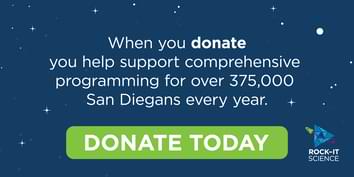Craveology Cafe and the North Star Science Store are temporarily closed for renovation.
Hannah Pettit
Being a scientist and a queer, non-binary person are two parts of myself that I usually do not consider to be related to each other. I often say I have “two sides”– the queer side where I can express myself and the scientist side which is serious and focused. I was a scientist before I realized I was queer and becoming comfortable in my queer identity while in the biomedical research field it was challenging to navigate.
Being queer is an expression of self. It is all consuming and joyous, but as I was coming out, I didn't always feel like this was the case. Gaining confidence as a queer person demanded attention, self-compassion, and the freedom to explore. However, I felt constrained in my ability to do so while doing research. At the time, I was interning at a biotech company during college, and while I was not afraid to come out, I did not feel like there was a place for it. The work was extremely fast paced and there wasn't an acknowledgment of people's full identities beyond being a scientist. As a newly out queer person, I felt like I was blooming, but at work I felt reduced down to a singular role. I did not know if there was a space for all of me in research.
I came back from that internship wondering if I should pursue other options in a field where I could show more of myself. I decided to stick it out, and when I returned to work in my undergraduate lab, a new graduate student had joined the lab and she was proudly out. Her presence gave me the courage to come out of myself, and my world changed. I felt myself becoming more confident both in myself and in my abilities of her as a scientist. I began to suspect that perhaps these “two sides” of myself blend and synergize to make something more powerful than their individual parts.
I am now realizing that my experiences as a queer, non-binary person and a scientist may be built on the same principles. I credit my journey in realizing my queer, non-binary identity to my integrity, open-mindedness, and courage. Reflecting, I think these qualities are what make a good scientist as well. These attributes have gifted me both the ability to be true to myself, and the responsibility to be an ethical and impactful researcher.
In graduate school, I am proudly out as a queer, non-binary scientist. I am studying pancreatic cancer in hopes that I can ask bold questions and make an impact on patients’ lives. I need my whole heart to do this, and that would not be possible without the freedom to be me.
Ser científico y persona queer y no binaria son dos partes de mí misme que normalmente no considero que estén relacionadas entre sí. A menudo digo que tengo "dos lados": el lado queer donde puedo expresarme y el lado científico que es serio y centrado. Fui científico antes de darme cuenta de que era queer y pudiera sentirme cómode con mi identidad queer y esto fue un reto cuando estaba en el campo de la investigación biomédica.
Ser queer es una expresión de uno mismo. Es absorbente y es alegre, pero cuando salí del clóset, no siempre sentí que ese fuera el caso. Ganar confianza como persona queer exigió atención, autocompasión y la libertad de explorar. Sin embargo, me sentí limitade en mi capacidad para hacerlo mientras hacía investigación. En esa época, estaba haciendo una pasantía en una empresa de biotecnología al mismo tiempo que estudiaba en la universidad y, aunque no tenía miedo de salir del clóset, no sentía que hubiera lugar para ello. El trabajo era extremadamente acelerado y no se reconocían las identidades completas de las personas más allá de ser científico. Como una persona queer recién descubierta, sentí que estaba floreciendo, pero en el trabajo me sentí reducide a un papel singular. No sabía si había un espacio para todo mi ser en la investigación.
Regresé de esa pasantía preguntándome si debía buscar otras opciones en un campo en el que pudiera mostrar más de mí misme. Decidí aguantar, y cuando regresé a trabajar en mi laboratorio de pregrado, una nueva estudiante de posgrado se había unido al laboratorio y ella había orgullosamente salido del clóset. Su presencia me dio el valor para salir yo misme, y mi mundo cambió. Me sentí cada vez más confiade tanto en mí misme como en mis habilidades como científico. Empecé a sospechar que tal vez estas “dos partes” de mí misme se mezclan y hacen sinergia para formar algo más poderoso que cada una de sus partes individuales.
I now realize that my experiences as a queer, non-binary person and scientist can be based on the same principles. I attribute my journey of realizing my queer and non-binary identity to my integrity, open mind, and courage. On reflection, I believe that these qualities are what also make a good scientist. These attributes have given me both the ability to be true to myself and the responsibility to be an ethical and impactful researcher.
In graduate school, I am proud to be a queer, non-binary scientist. I'm studying pancreatic cancer in the hope that I can ask bold questions and make an impact on patients' lives. I need all my heart to do this, and that wouldn't be possible without the freedom to be me.
